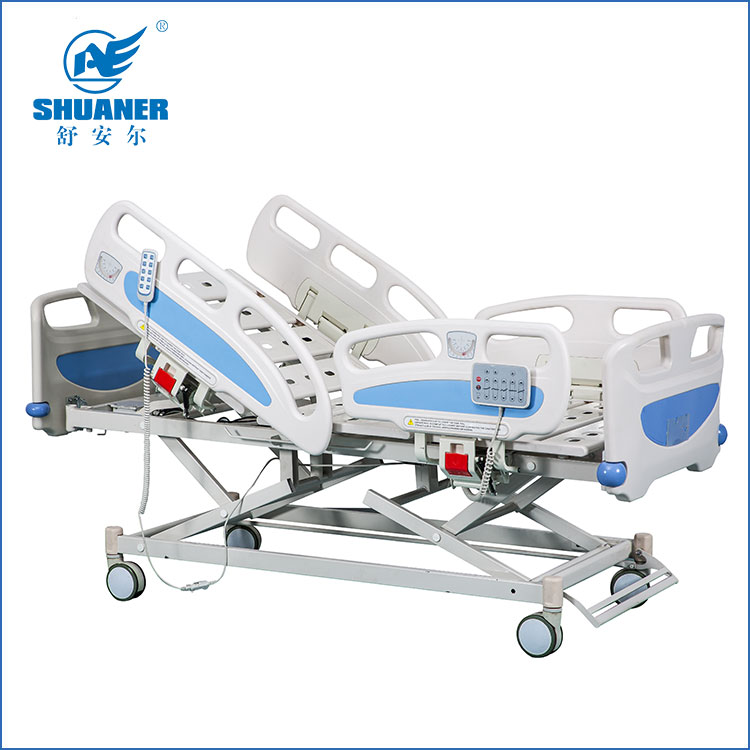- English
- Español
- Português
- русский
- Français
- 日本語
- Deutsch
- tiếng Việt
- Italiano
- Nederlands
- ภาษาไทย
- Polski
- 한국어
- Svenska
- magyar
- Malay
- বাংলা ভাষার
- Dansk
- Suomi
- हिन्दी
- Pilipino
- Türkçe
- Gaeilge
- العربية
- Indonesia
- Norsk
- تمل
- český
- ελληνικά
- український
- Javanese
- فارسی
- தமிழ்
- తెలుగు
- नेपाली
- Burmese
- български
- ລາວ
- Latine
- Қазақша
- Euskal
- Azərbaycan
- Slovenský jazyk
- Македонски
- Lietuvos
- Eesti Keel
- Română
- Slovenski
- मराठी
- Srpski језик
How to choose the manufacturer of electric medical beds
2025-01-03
Choosing an electric medical bed manufacturer is an important decision because it is directly related to the quality, service life, patient safety and operating efficiency of medical facilities. Here are a few key considerations when choosing an electric medical bed manufacturer:
1. Product quality and safety
Materials and workmanship: Ensure that the materials used in electric medical beds meet medical requirements such as durability, antibacterial, and anti-corrosion. The stability, load-bearing capacity, and smoothness of the bed frame are the basis for safe use.
Safety certification: Check whether the manufacturer meets international quality standards and medical device certifications, such as ISO 13485, CE certification, FDA certification, etc. These certifications demonstrate that products meet industry specifications for safety, quality control and design.
Electric system quality: Electric medical beds are usually equipped with an electric lifting system to ensure the stability of the motor and durability for long-term use. Choose a manufacturer with a stable and low-noise electric system to avoid system failures that may affect the use of beds.
Protective design: For example, whether the bed is equipped with an anti-fall device, adjustable head/foot design, etc. to ensure patient safety.
2. Technical support and innovation
Intelligent and innovative functions: Currently, many electric medical beds are equipped with intelligent operating systems, such as remote control, bed position monitoring, wireless control, etc. Choose manufacturers that have innovative capabilities and can provide intelligent solutions to improve the efficiency and effectiveness of medical services. quality.
Customized features: Some medical facilities may require specially designed beds, such as to accommodate patients with specific diseases. Make sure the manufacturer can provide customized solutions based on your needs.
3. After-sales service and warranty
After-sales guarantee: Electric medical beds are one of the medical equipments that are used frequently and have low tolerance for failure. Therefore, it is crucial to choose a manufacturer that provides good after-sales service. Confirm the warranty period, maintenance services and technical support provided by the manufacturer.
Maintenance and spare parts support: Ensure that manufacturers can provide timely maintenance and spare parts support, especially when failures occur. Rapid service response can reduce the operational risks of medical institutions.
Training and support: Some manufacturers will provide operational training and on-site technical support. Find out if training can be provided to help medical staff become familiar with the use and care of the equipment.
4. Production capacity and delivery time
Production Capacity: For medical institutions or hospitals, timely delivery and stable supply chain are crucial. Choose a manufacturer with stable production capacity and sufficient inventory to ensure that demand is met in a timely manner.
Delivery time: Ensure that the manufacturer can provide a reasonable delivery time and complete the delivery within the agreed time. If there is a large-scale procurement demand, consider whether the manufacturer can undertake it and deliver it on time.
5. Price and cost-effectiveness
Price transparency: Choose manufacturers with transparent prices and reasonable quotes. Price should be measured against the product's quality, features, and technical support, not just the lowest price.
Cost-effectiveness: Comprehensive consideration of product quality, after-sales service, delivery cycle and other factors, choose manufacturers with high cost-effectiveness. Don’t just look at price, but also evaluate the equipment’s durability and long-term operating costs.
6. Manufacturer’s reputation and experience
Industry experience: Choose a manufacturer with many years of industry experience. Manufacturers with rich experience can provide more guarantees in design, production and after-sales service.
Reputation and customer evaluation: Understand the market reputation and credibility of the manufacturer through the Internet, industry forums, and feedback from other medical institutions. You can also contact other hospitals or medical institutions that already use the brand to learn about their actual experience.
7. Environmental protection and energy saving
Environmentally friendly design: As a long-term medical equipment, electric medical beds should be environmentally friendly and energy-saving. Choose manufacturers that focus on energy efficiency and environmentally friendly materials in design to reduce energy consumption and environmental impact during equipment use.
Comply with environmental standards: Confirm that products comply with international environmental standards and regulations on harmless substances to ensure that they meet the sustainable development needs of hospitals and society.
8. Certification and Legal Compliance
Legal compliance: Choose manufacturers that comply with relevant national and regional medical equipment management regulations to ensure compliance in the design, manufacturing, sales and use of electric medical beds and avoid possible legal risks.
Certification documents: Manufacturers are required to provide relevant certification certificates, quality inspection reports, etc. to ensure that the equipment meets the required industry standards.
9. Supply chain management and parts
Parts supply: Ensure that manufacturers can provide long-term and stable parts supply. A high-quality parts supply chain can ensure long-term stable operation of equipment and quickly provide replacement parts in the event of failure.
Supply chain stability: Confirm the manufacturer's supply chain stability to ensure they can provide required components and accessories on time during equipment repair and maintenance.
Therefore, when choosing an electric medical bed manufacturer, focus on product quality, manufacturer's technical capabilities, after-sales service, price and supply chain. Choosing a manufacturer with rich experience, complete certifications, and guaranteed after-sales service will not only ensure the long-term reliability of the equipment, but also ensure the safety of patients and the efficient operation of medical institutions.




